Olivia Williams interview: 'Are you on drugs?' 'No I've just spent the day acting' | reviews, news & interviews
Olivia Williams interview: 'Are you on drugs?' 'No I've just spent the day acting'
Olivia Williams interview: 'Are you on drugs?' 'No I've just spent the day acting'
The actress summoned to Hollywood who lived to tell the tale, wittily
Olivia Williams’s first film was, (in)famously, seen by almost no one. The Postman, Kevin Costner’s expensive futuristic misfire, may have summoned her from the depths of chronic unemployment, but the first time anyone actually clapped eyes on her was in Wes Anderson’s Rushmore, in which Bill Murray most understandably falls in love with her peachy reserved English rose. Then came The Sixth Sense, in which with great subtlety she in effect gave two performances as the wife/widow of Bruce Willis, depending on whether you were watching for the first or second time.
The summons to Hollywood was quite an introduction for someone whose entire twenties had been missed by all but fans of poetic dramas dutifully exhumed by the RSC. Her career since then has been a shining example of the old adage that a well-planned acting career is a marathon not a sprint. When Williams, armed with a degree in English from Cambridge, started attending auditions various famous contemporaries were always ahead of her in the queue. Some now work a great deal less than she does. Her CV includes her readings of great icons – Jane Austen in Miss Austen Regrets, Eleanor Roosevelt in Hyde Park on the Hudson. She was the tragically betrayed sister in The Heart of Me (source: Rosamond Lehman) and, by complete contrast, the finally triumphant wife of a PM in The Ghost (source: Robert Harris). There was a tragic echo of her nursery teacher from Rushmore in the secondary school teacher she played in An Education who is eager for her pupil not to throw off her future for love. She has also joined the trail of British actors starring in major US TV series in Joss Whedon’s Dollhouse and Manhattan, which told the story of the Manhattan Project. She was back on the BBC in The Halcyon, as the chatelaine of a smart hotel in wartime.
In all this screen work, Williams has been an occasional visitor to the stage. Whenever she does go back, as often as not it’s to the National: the Princess of France in Love’s Labour’s Lost, Amy O’Connell, who dies after an abortion in Harley Granville Barker’s Waste, and now in Lucy Kirkwood’s Mosquitoes. In Kirkwood’s first play since the award-winning Chimerica, Williams plays a high-achieving physicist domiciled in Switzerland, lured thither by the Large Hadron Collider at Cern. Her sister Emily, played by Olivia Colman, a low-achiever stuck in Luton. Hark what discord follows (pictured below: the two Olivias in rehearsal). Olivia Williams talks to theartsdesk.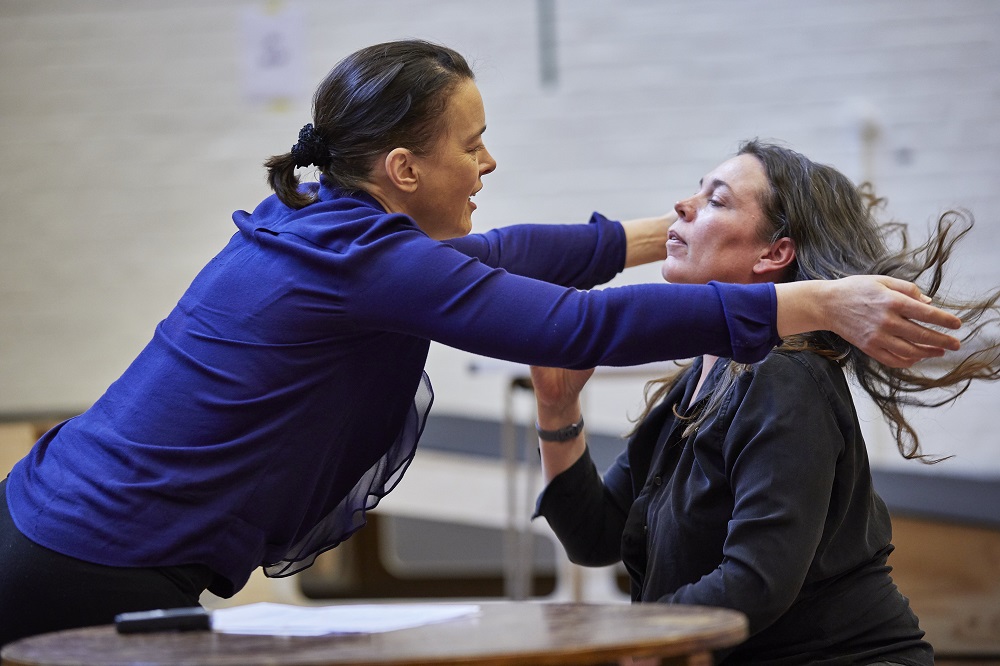
OLIVIA WILLIAMS: No because as an actor you’re constantly pretending you can do things that you can’t, be it speak a foreign language, dance, ride a horse, juggle. You find ways of looking like or sounding like or dressing as if you do know what you’re talking about, and you try and learn the lines well enough that it falls out of your body as it would out of somebody who does know what they’re talking about. Problems arise if anything goes in any way off piste. At the moment I’m struggling with logarithm and algorithm which I am sure are two very different things, and I swear I heard a physicist snort with derision when I stumbled over the line last night – and then you fall into a black hole, which is a relevant analogy in this play, and you can’t get out again. But it’s no more frightening than if you’re trying to pretend you can juggle and you drop a ball or when the horse turns left when you thought you were telling it to turn right – neck reining in the US works on the opposite principle to UK reins, which makes for disaster when acting on a horse on a precipice.
On Manhattan they found us physicists to talk to and they sort of rolled their eyes in an “I thought as much” way. Because actors don’t ask them about particle physics; we ask them what model of Birkenstock they wear to work or what they had for breakfast or whether they have time to brush their hair in the morning. You ask all the wrong questions for a physicist but the right questions when you’re trying to impersonate a physicist.
When reading the play it was fairly clear to me that you would be playing Alice not Jenny.
I’m very very offended by that. Nonetheless you are correct.
Is there a part of you that would love to be cast as the calamitous dimwit?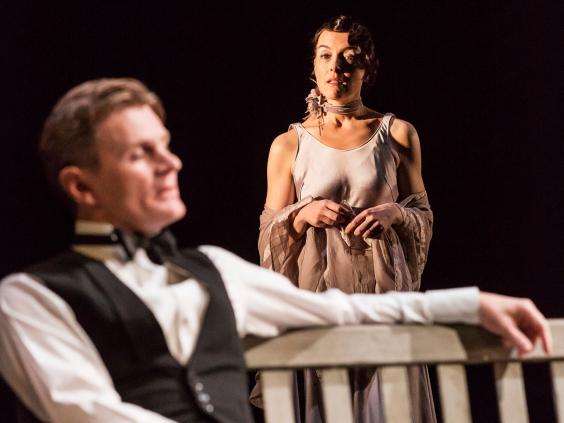 When I did The Heart of Me I clearly stated in the audition that I wanted to be up for the Helena Bonham Carter ditzy arty sister with loose morals and a free spirit, not the uptight needed-a-good-shag-against-a-firm-surface sister. And recently when I was in Waste there were two roles I could have played – the earnest, possibly lesbian, bluestocking sister and the tragic party girl. I asked if I might be considered for tragic party girl. I owe it to the broadmindedness of Roger Michell that he agreed to cast me as Amy O’Connell. So on one occasion that has come to pass. Not one disapproving or over-educated phrase escaped her lips (pictured above: Williams with Charles Edwards in Waste, photo by Johan Persson).
When I did The Heart of Me I clearly stated in the audition that I wanted to be up for the Helena Bonham Carter ditzy arty sister with loose morals and a free spirit, not the uptight needed-a-good-shag-against-a-firm-surface sister. And recently when I was in Waste there were two roles I could have played – the earnest, possibly lesbian, bluestocking sister and the tragic party girl. I asked if I might be considered for tragic party girl. I owe it to the broadmindedness of Roger Michell that he agreed to cast me as Amy O’Connell. So on one occasion that has come to pass. Not one disapproving or over-educated phrase escaped her lips (pictured above: Williams with Charles Edwards in Waste, photo by Johan Persson).
In Mosquitoes you’re playing a scientist from a family of scientists and Jenny is the odd one out. That is somewhat analogous to your own position as the only non-barrister in a family of barristers. Do you ever wonder what would have happened if you’d gone into law or has the decision to veer away from the family trade felt right all the way through?
No, I’m constantly yearning for the barrister’s life. I consider it a stupid mistake on a regular basis. But the thing that convinces me that it wouldn’t have gone so well is I do have a zero capacity to read things I don’t want to read and lawyers do have to do a lot of homework. The only reason I learn lines is because I love acting. And if I don’t love something I really can’t do it. I’m just incredibly lucky that I manage to earn money doing something I love. It’s a terrible example to my children. I am constantly telling them to do things they don’t want to do when I know I never did and I never could. I think my greatest regret is I’m never cast as a lawyer. Never been a lawyer. I’ve actually been in an audition and given them my best lawyer and they go, “No, no, lawyers don’t do that.” And I’m like, “No they do, that’s exactly what they do!”. But I look forward to impersonating my parents one day. Maybe I’ll make it onto the Bench instead. Time for a TV series about judges.
Why do you love acting?
I’m just about as happy as I can be between action and cut and between curtain up and curtain down. I remember coming back from my first day of acting in The Sixth Sense. I’d been hanging around in Philadelphia for weeks and then I got to do a scene. I came off the set and the driver said, “Are you on drugs or something? You’ve got a dumb smile on your face.” And I said, “No, I’ve just spent the day acting. I couldn’t be happier.”
Although you didn’t go into law, you do have a very good degree from a very good place. Has it been useful to you, that immersion in English literature?
For the record it was a pretty average degree from a very good place. but that’s a good question. On immediately leaving that university and going to drama school I think I was given a hard time about it and I was resentful of that. “You come here with your Oxbridge ways” was the underlying tone. But the truth is that I did go there with my Oxbridge ways, and when I started acting professionally and watching other actors act I finally realised that a critical approach to the text is a massive handicap - you shouldn’t be finding fault with the text, or tracing its roots in the Indo-European tradition, you’re trying to be it. I learned so much from [the actress] Anastasia Hille – more about acting than anybody else. Her approach to the words was entirely emotional, and that needs to be your response. You need to stop judging it and incorporate it in the literal sense of the word – turn the text into a part of your body. Embody it.
But I have found as I got older that a facility with language, an understanding of how it’s constructed and connecting what I learned with what I’ve observed, feeds my pleasure in what I do. Lucy Kirkwood breaks down language and punctuation in a completely courageous way – it’s almost like doing a verbatim play where actors have to learn exact pauses and intakes of breath. But what you find with Mosquitoes is that it looks like it’s verbatim and all very naturalistic, then you realise it’s incredibly musical. It’s like jazz. I say that cautiously because there was a programme on Radio 4, which is the fount of most things interesting and truthful, about how the phrase “it’s like jazz” is overused and misused. But there is incredible syncopation and layering of different rhythms in Lucy's language. When you see it on the page it’s terrifying. I have a wonderful accent and voice coach called Jill McCullough and she has a learning technique where you click your fingers for a comma and clap your hands for a full stop. And that has made learning Mosquitoes – and I say this advisedly – like jazz.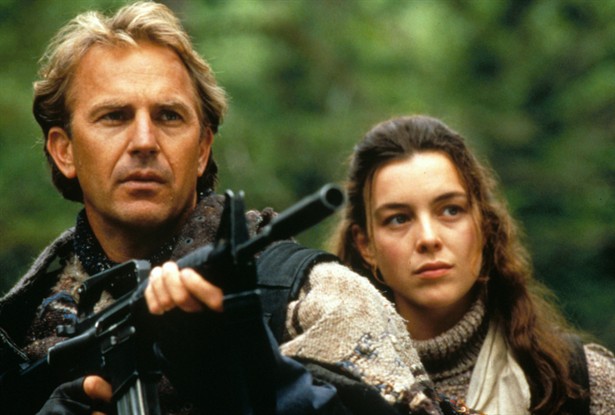 When were you last asked about The Postman?
When were you last asked about The Postman?
There was a nasty rash of conversations that came up over coffee in the rehearsal room. I was being asked by the young ones about my professional snog list which I still maintain is pretty impressive even though it only is appreciated by someone of our generation. To younger actors it’s just this list of old men that their grannies fancied. That was the last time I was asked about The Postman.
That phase when you were in three big films with Kevin Costner, Bill Murray and Bruce Willis was quite an introduction to the film industry. How do you now think of that phase of your career?
I had a great time and I can’t really believe it happened in some ways. It was like being kidnapped by aliens. I guess if you look at some of my contemporaries, I’m not there any more, I’m not in Hollywood, not living there and not fighting the fight. And yet rehearsing this play here and now I really can’t think of anywhere I’d rather be. I do genuinely believe that if that hadn’t happened to me I wouldn’t be doing this work now. I got incredible access and insight to amazing things (Carrie Fisher's Oscar party) and amazing places (dropped from a helicopter onto a snowy peak at Jackson Hole). I went from complete ignorance to working with some of the foremost people in their field and I would have been an idiot not to learn from that - to appreciate that.
The Sixth Sense was shot by Tak Fujimoto who shot Rosemary’s Baby. I made a film with Roman Polanski, seeing what lens he uses, where he puts the camera, how he constructs a scene. I’ve made a film with Wes Anderson. And just to be in the orbit of Bill Murray – he is an extraordinary man and an extraordinary actor and an extraordinary mind. I’ve worked with him twice in two inconceivably different films. I took Bill Murray to see Richard Briers in Ionesco’s absurdist play The Chairs on Broadway. Bill knelt at Richard’s feet in awe. It’s making me smile now, to remember it. And I learned about acting on film. Kevin was directing and acting in The Postman so he would haul me over to the monitor and show me my work and show me how to make it better. Absolute masterclass. Whatever you say about Kevin – you might not say anything about Kevin, never mind have an opinion on his oeuvre – but he knows how to work it on film. He knows what he’s doing.
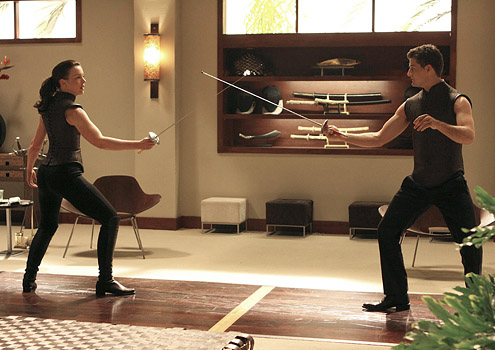 You have done two big television shows in the States, Dollhouse and Manhattan, both of which were cancelled. Was two seasons enough for you in both cases?
You have done two big television shows in the States, Dollhouse and Manhattan, both of which were cancelled. Was two seasons enough for you in both cases?
Whenever I do a job I do it to be best of my ability. I might fight like a dog during negotiations not to go away from my family for four months of the year, and certainly I fight being trapped in feudal contracts that were made illegal in England around the time of Magna Carta. But once again I have been very lucky. I adored Dollhouse (pictured above) and was directed by Joss Whedon who wrote all my dialogue and I joined his crazy Whedonesque world – I had absolutely no idea of its existence, but a working knowledge of Comic Con and sci-fi is probably more relevant to an actor now than reading The Empty Space.
I loved Manhattan. I fought going to live in Santa Fe, but ended up galloping around the high desert with some fearless cowboys and I learned things about the atomic weapon that are very useful to an Eighties member of CND. I would not have missed it for the world and it was heartbreaking when it was cancelled. We needed another season of Manhattan. We shot the Trinity test but never made it to the dropping of the bomb, and I think it is a matter of some urgency that we remind ourselves of the consequences of atomic warfare. The fallout from the Trinity test is still killing people in New Mexico.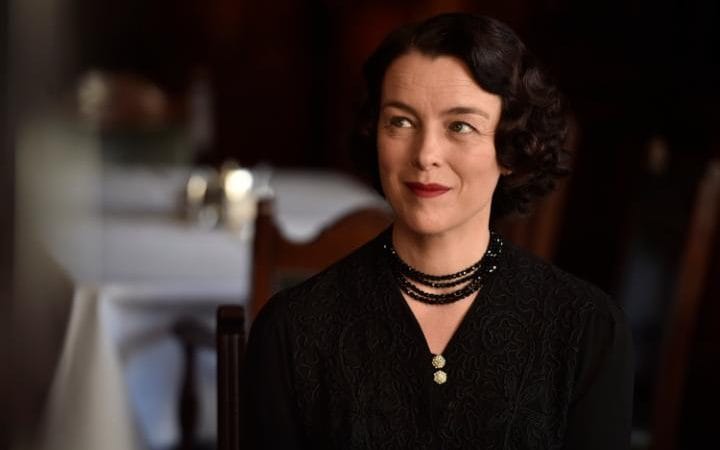
When you first start acting, a young woman’s drama is traditionally centred around finding a husband, and ends with her marriage. I suppose it is progress that in the middle period of my career, the drama followed me into marriage but seemed to centre on the fact that every single one of my husbands died – The Postman, Rushmore, [spoiler alert] Sixth Sense. I had to warn any man cast as my husband, “You’re not going to make it to the final credits.” I am grateful that great parts are being written for middle-aged women, but as you rightly point out, the drama now seems to centre on the fact that aged around 49, my character’s husband – if she has managed to find one and he’s not dead – is going to fuck somebody else.
- Mosquitoes is at the National Theatre until 28 September
Overleaf: Olivia Williams's filmography in pictures







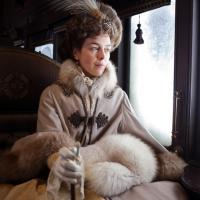
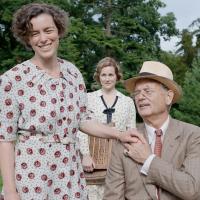


Add comment